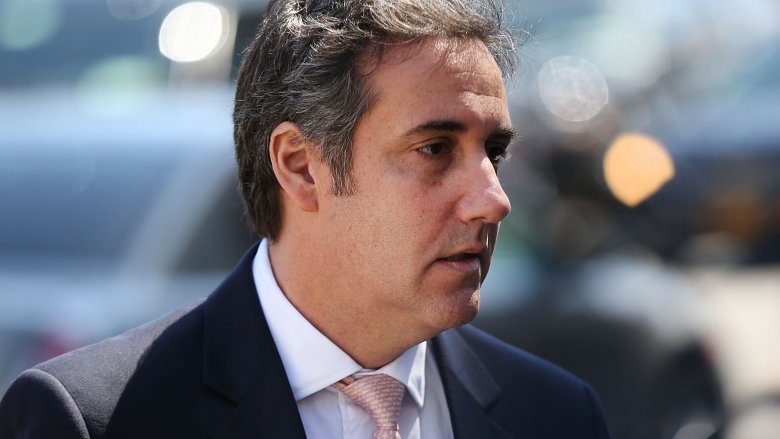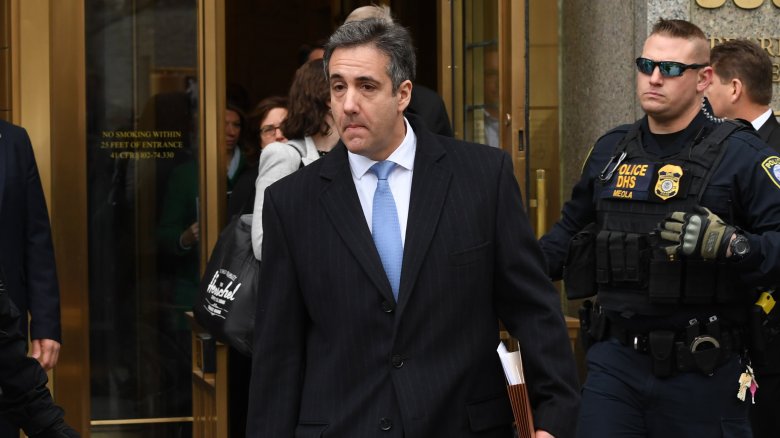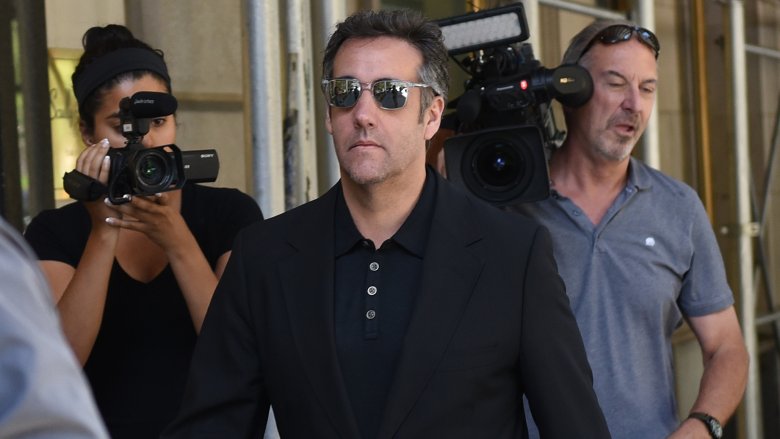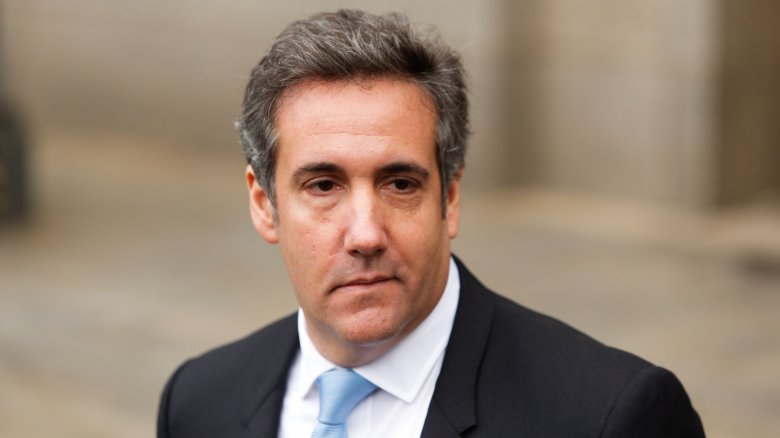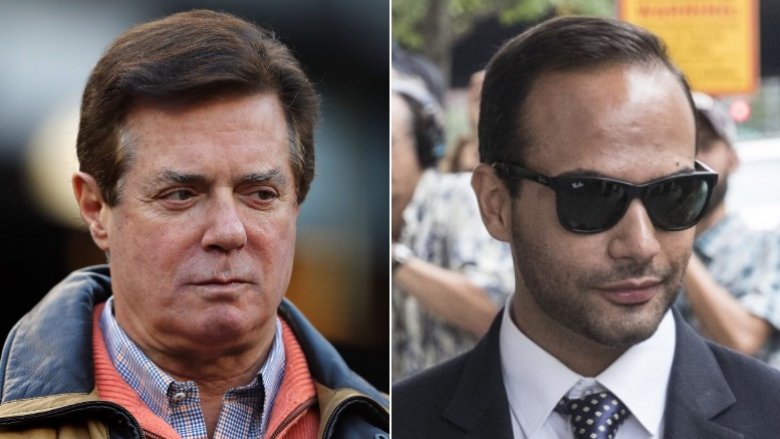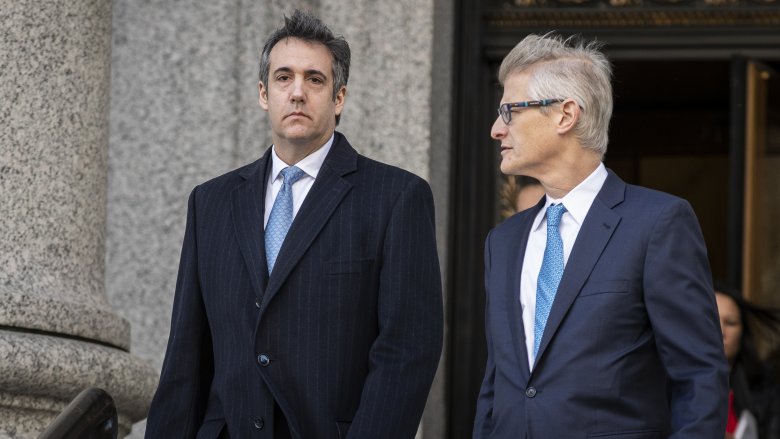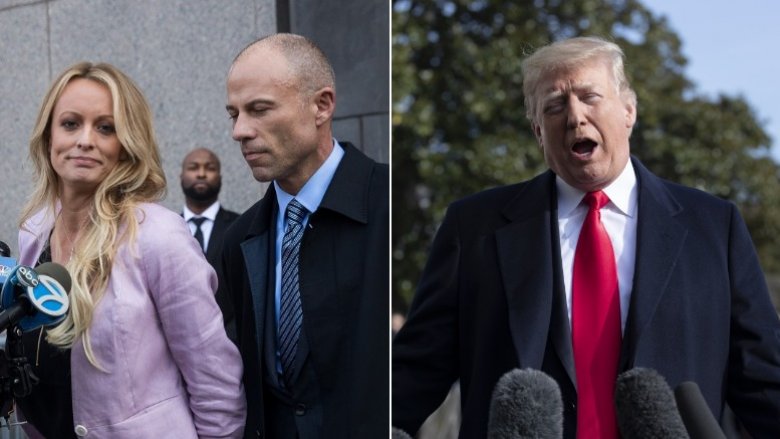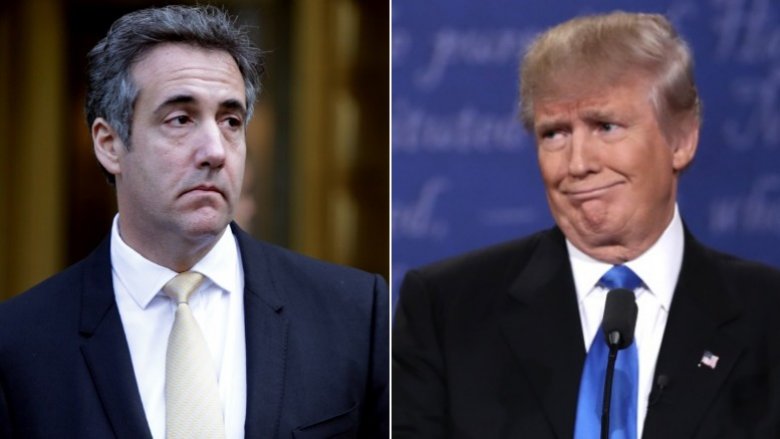What Life In Prison Will Be Like For Michael Cohen
ABC News once described Michael Cohen as Donald Trump's "special counsel and a juggler of people and projects." This was in 2011, before Trump was president, and it was a nice way of saying that Cohen was Trump's fixer — a powerful, discreet, go-to guy who, in his own terms, would "do everything in [his] power to resolve [conflicts] to Mr. Trump's benefit."
Fast-forward seven years and the relationship between these two men couldn't be more opposite. In December 2018, Cohen received a three-year prison sentence after pleading guilty to various charges, including campaign finance violations, which, according to The Washington Post, implicate his former boss and mentor as well. Trump has since professed his innocence and distanced himself so far from Cohen, it's like they barely knew each other. Meanwhile, The Atlantic reported that Cohen proclaimed his "freedom" from Trump at his sentencing, claiming he'd "been living in a personal and mental incarceration" since taking a job with the developer-turned-reality-TV-star.
Though Cohen freed his spirit, he did so at the peril of his physical body, which will be quite literally incarcerated come March 2019, when he is required to report to prison. Let's take a look at what life will be like behind bars for Michael Cohen.
What did he do?
Before we get to Michael Cohen's prison sentence and how he'll likely spend it, let's backtrack to review the crimes to which he pleaded guilty. According to NBC News, the charges ranged from tax evasion, to bank fraud, to the aforementioned campaign finance violations, to making "false statements to Congress."
The first two sets of charges had to do with Cohen's personal and business income from a taxicab business he operated, for which he allegedly failed "to report more than $4 million in income from 2012 through 2016," as well as "[understated] debt from [the business] in the process of applying for a home equity line of credit with a bank." The latter two charges related to Cohen's orchestration of hush money payments to former Playboy Playmate Karen McDougal and adult entertainer Stormy Daniels — who both allegedly had affairs with Trump prior to his presidency — and his confession that he lied to Congress about the timeline of a potential Trump Tower project in Moscow.
In his sentencing statement (via The Atlantic), Cohen expressed remorse for his crimes, which he attributed to his "blind loyalty" to Trump. That regret failed to dissuade Judge William H. Pauley III, who referred to Cohen's offenses as "a veritable smorgasbord of fraudulent conduct" for which "the magnitude, breadth, and duration ... requires serious deterrence." Just how hard did Pauley throw the book at Cohen? Glad you asked...
What was his sentence, and where will he spend it?
In addition to 36 months of incarceration, Michael Cohen also received "three years of post-release supervision" and was ordered to pay nearly $2 million in restitution, fines, and penalties for "lying to congress," according to NBC News. Judge William H. Pauley III also reportedly agreed to "recommend Cohen serve his term in Otisville (per Courthouse News), which is a shorthand term for a medium security correctional facility relatively close to New York City (which we'll get to in a moment).
Now, if you're thinking three years and a few million in fines doesn't seem like a lot, you may be onto something, considering Newsweek reported in August 2018, that Cohen initially faced a "maximum sentence" of "65 years" prior to striking a plea deal with federal prosecutors. Even then, as part of the plea deal, "Cohen agreed to not challenge a prison sentence of 43 to 63 months." Given CNBC's projection that Cohen "will be eligible to be released after serving 30½ months, assuming credit for good behavior," it sure seems like Trump's defected defender didn't make out so bad.
How did he get such a sweet deal? You're already a step ahead of us.
Did cooperation with prosecutors affect his sentence?
According to The New York Times, Michael Cohen "refused to sign a full cooperation agreement," which "would have required Mr. Cohen to admit to every crime he ever committed and to offer all the details he knew about the crimes of others." However, PBS reported that he did cooperate in a limited capacity with the Southern District of New York (SDNY) and in a "substantial and significant" way with Special Counsel Robert Mueller's investigation into possible links between the Trump campaign and Russian efforts to influence the 2016 election. As such, the SDNY declined Cohen's lawyers' request of no prison time, instead recommending an unspecified "modest variance" from the "federal sentencing guidelines of 51 to 63 months."
In his sentencing memorandum, Mueller did not recommend a specific term but stressed the importance of the detail and the level of Cohen's cooperation with his investigation. As a result, he more generally recommended "that Cohen serve any sentences he gets concurrently."
It should be noted that Cohen's lawyers described the apparent disparity in cooperation between the two entities as Cohen's attempt at protecting the special counsel's investigation. According to The Atlantic, Cohen's lawyer said his client believed that if he signed such an agreement with prosecutors, there was a possibility that "Trump might shut down the investigation." Granted, that's pretty speculative on Cohen's part, but it does beg the question: Could signing such a deal have gotten him even more leniency?
What's up with Otisville?
Though the final decision on where Michael Cohen will spend his prison time is officially up to the Bureau of Prisons (BOP), the sentencing judge's recommendation is taken into account. If the BOP lets Cohen have his way and sends him to Federal Correctional Institution, Otisville in upstate New York, he's not exactly looking at hard time. Located about 70 miles northwest of New York City, FCI Otisville has the distinction of once landing on Forbes' 10 Cushiest Prisons List, according to CNN. Why?
For starters, FCI Otisville is a "medium security correctional institution," meaning Cohen won't be locked up with violent offenders. On top of that, the facility boasts "weights, cardio equipment, bocce ball and horseshoes," as well as "a basketball court, handball court, tennis area, baseball field, and running and walking areas," because the real crime would be to let white-collar offenders lose their jump shot. By the way, FCI Otisville is also where fraud king Bernie Madoff wanted to go before getting sent to North Carolina instead.
"It's not just good. It's sweet. That's why you request to go there," a former inmate told the New York Post — which dubbed FCI Otisville "a castle behind bars." Geez. Is this a prison or a summer camp?
Have other Trump affiliates-turned-inmates had a hard time?
Former Trump campaign chairman Paul Manafort (above left) and former Trump foreign policy analyst (or "coffee boy" as another Trump aid dubbed him) George Papadopoulos (above right) also went to the slammer after the election.
Manafort initially awaited trial on charges of "obstruction of justice and conspiracy," "foreign lobbying registration violations," and "bank fraud," at Northern Neck Regional Jail in Warsaw, Va., according to CNN. As a designated "VIP," Manafort was reportedly placed there because the usual location was "too risky" for him. Manafort reportedly enjoyed his own computer with internet access and private bathroom, according to Politico, but the cushy digs didn't last. He eventually headed to less glamorous holdings at Alexandria Detention Center, where the internet access is sparse, and the meals aren't great. However, he was still expected to be separated from the general population due to his status as a public figure.
Papadopoulos, who pleaded guilty to "lying to the FBI" (per The Washington Post) completed a two-week stint in a minimum security federal prison camp in Wisconsin in December 2018. There aren't many details about Papadopoulos' specific time there, although a visitor to the facility once told The Chicago Tribune it's "like a hotel." The Washington Post said a reality TV camera crew documented his every move, so his experience may not be a mystery to the world forever.
Will Cohen's safety be a concern?
We should clarify that no prison sentence should be taken lightly, and, of course, there are inherent dangers in any correctional facility that need to be viewed as serious problems that pose a threat to the inmates that are housed there. That said, experts on prisons have already spoken out about the kind of lockdown experience Michael Cohen can expect, and it sounds like a best-case scenario.
Speaking with NBC News, lawyer Alan Ellis, who wrote a guidebook on federal prisons, said that if Cohen is sent to FCI Otisville, which actually "has both a medium-security prison and minimum-security camp," he'll likely land at the latter. "It's not the worst place in the world to end up," Ellis told NBC, adding, "It'll be boring. He'll lose his freedom, but he won't be in fear of his safety there."
Silver linings?
What did social media think of Cohen's sentence?
In the age of social media, no headline news gets by without parallel reports of the reactions of celebrities. With Michael Cohen's close ties to the sitting president of the United States, interest in his case couldn't be more piqued, which is why even a comedian such as Patton Oswalt couldn't resist tweeting this zinger: "Sending a Raquel Welch poster to Michael Cohen."
Adult entertainer Stormy Daniels and her lawyer, Michael Avenatti (above left), who have a direct connection to some of Cohen's crimes, also chimed in, essentially taking full credit for Cohen's downfall. And, of course, what would a tweetstorm be without the limited-character musing of POTUS himself. Trump did not disappoint, firing off a string of tweets that asserted his innocence and that claimed Cohen pleaded guilty to the campaign finance violations in order to "embarrass the president and get a much-reduced prison sentence."
It should be noted here that according to The Washington Post, "government prosecutors themselves directly implicated Trump in those [campaign finance] violations. Maybe they should have Snapchatted that?
Will Trump pardon him?
For those of you in a hurry, the quick answer here is: Not bloody likely. But if you're interested in a bit more background, CNN offered a pretty good pre-sentencing breakdown on why Trump's former "pitbull" is probably forever banished to the proverbial doghouse. The news outlet cited inside sources who claimed Trump promised Cohen a pardon if he stayed "on message" about the Stormy Daniels payment, but that all changed when Trump started actively distancing himself from Cohen in the press.
The possible pardon was really sent packing after both sides finally addressed it directly, with Cohen's lawyer specifically stating that Cohen didn't even want a pardon from the man in the White House. Then, Trump's attorney Rudy Giuliani stated, "Pardons are off the table, but it's not a limitation on his power in the future to pardon in any case." In other words: Trump could do it, but he's not going to.
So, is there a chance that Trump will have a change of heart now, knowing his former right-hand man is going away for three years? If Cohen's remarks at his sentencing, which included his description of Trump's alleged "dirty deeds" and "elicit acts" are any indication, we seriously doubt it.

